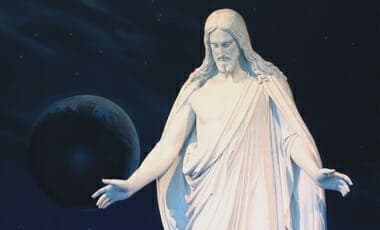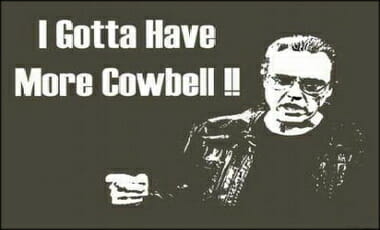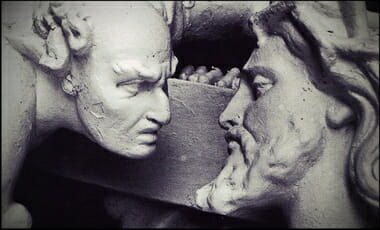James White and Jeff Durbin exemplify just how 5-point Calvinism can destroy a good apologetic. It allows for an easy refutation of a Mormon apologist to show the God of Christianity is an evil god.
This defining sovereignty as some “determinism” creates a god more in line with a Muslim view of god than a Judeo-Christian view. 5-Pointers admit infants are created for destruction in Calvinism: “We may rest assured that God would never have suffered any infants to be slain except those who were already damned and predestined for eternal death.” – John Calvin The same in ISLAM: Babies CAN Go To HELL In Islam | Not only that, but we are more moral than the god of Calvinism or Islam.
In other words, the god of Calvinism. (See more in a previous post HERE)
As I am studying this I wonder if a few of the Reformers borrowed the fatalism of Allah. At any rate, you can watch James and Jeff (and other Calvinistic theologians/pastors, but not always stated as clearly) say that the god of the Bible authored sex trafficking and the Holocaust. Bravo to the Mormon in slapping these two down. Mormons are easy to discuss issues with… unless you posit a god thru the rose colored lenses of the Calvinistic systematic. [See my using lower case for “god” — the Calvinistic god is too small. Like the Mormon god… not the God of the Bible] Do not leave a comment unless you are willing to have a conversation over a busy work schedule. BTW, these are all arguments a healthy view of a theistic God used against philosophical naturalism – atheism.
VIDEO DESCRIPTION:
Dr. Leighton Flowers interacts with a recent video where a young Mormon picks apart the Calvinistic determinism of James White and Jeff Durbin making their perspective seem completely irrational and untenable. Theistic determinism is an unnecessary burden that some Christians have adopted making it virtually impossible to rationally defend scriptural truths against the false teaching of groups like Mormons. Theology will drive your methodology and one’s apologetic suffers when they adopt a deterministic theology, as witnessed in this video.
A clip from The Potter’s Promise: A Biblical Defense of Traditional Soteriology:
If you do not already know what Calvinism is all about, I recommend that you study the teachings of Calvinists themselves and keep in mind that not all Calvinists are the same.[2] Learn from my mistake, you should always study the opposition’s viewpoint for yourself.
Back when I was a Calvinist, I had so saturated myself with Calvinistic preachers and authors that the only thing I knew of the opposing views was what they told me. Thus, I had been led to believe the only real alternative to Calvinism was this strange concept of God “looking through the corridors of time to elect those He foresees would choose Him.” Notable Calvinistic teachers almost always paint non-Calvinistic scholars as holding to this perspective. Once I realized I had been misled on this point, I was more open to consider other interpretations objectively. So, just as it is only fair to learn Calvinism from actual Calvinists, it is also only fair to learn Traditionalism from a Southern Baptist Traditionalist.[3]
With this in mind, here is a direct quote from John Calvin which most clearly reveals the Traditionalist’s major point of contention with our Calvinistic brethren:
“By predestination we mean the eternal decree of God, by which He determined with Himself whatever He wished to happen with regard to every man. All are not created on equal terms, but some are preordained to eternal life, others to eternal damnation; and, accordingly, as each has been created for one or other of those ends, we say that he has been predestined to life or death…[4] Some are predestined to salvation, others to damnation… Regarding the lost: it was His good pleasure to doom to destruction… Since the disposition of all things is in the hands of God and He can give life or death at His pleasure, He dispenses and ordains by His judgment that some, from their mother’s womb, are destined irrevocably to eternal death in order to glorify His name in their perdition… All are not created on equal terms, but some are predestined to eternal life, others to eternal damnation…”[5]
The very thought of a creator making human beings, with real conscious feelings and emotions, for the sole purpose of pouring out His everlasting wrath so as to manifest His glory leaves even Calvinists pondering.[6]
The “dreadfulness” of such a decree may accomplish some measure of terror filled “thankfulness” in the hearts of those who happen to be rescued from this unthinkable fate, but no one can objectively claim that they are not on some level troubled by such a doctrine.[7] If the Scripture clearly teaches us to adopt these doctrines and the emotional abhorrence that typically follows, then we certainly must submit ourselves to it. However, suppose that was not the intention of the biblical authors at all? Think of what damage such interpretations impose upon the church and the believer’s view of God if the “dreadfulness” of these doctrines are simply untrue.
[….]
John Calvin forthrightly reveals where his own systematic leads:
“A distinction has been invented between doing and permitting, because to many it seemed altogether inexplicable how Satan and all the wicked are so under the hand and authority of God, that He directs their malice to whatever end He pleases, and employs their iniquities to execute His judgments…
How foolish and frail is the support of divine justice afforded by the suggestion that evils come to be, not by His will but by His permission… It is a quite frivolous refuge to say that God otiosely permits them, when Scripture shows Him not only willing, but the author of them… Who does not tremble at these judgments with which God works in the hearts of even the wicked whatever He will, rewarding them nonetheless according to desert? Again it is quite clear from the evidence of Scripture that God works in the hearts of men to incline their wills just as He will, whether to good for His mercy’s sake, or to evil according to their merits.”[32]
Many modern day Calvinists would not go so far as to candidly admit what John Calvin does in the quote above. Yet, can the Calvinistic systematic avoid the necessity of this logical end? Their namesake does not think so.
FOOTNOTES:
[2] Examples of other points where Calvinists simply do not agree among themselves: (1) Atonement: Phil Johnson, President of Grace to You ministries, writes, “But second, don’t imagine that there is just one view for the Limited Atonement position and another view for the Unlimited Atonement position. As if there are two polar opposites here and they compete against each other. This is not really an either/or position even among Calvinists. And in fact, historically, the most intense debates about Limited Atonement have come over the past 400 years, they’ve all been intramural debates between Calvinists, among Calvinists… There are at least six possible Calvinists’ interpretations of it [Scripture]…” Phil Johnson, The Nature of the Atonement: Why and for Whom did Christ die? Quote taken from: http://www.bible-bb.com/files/MAC/SC03-1027.htm; [date accessed: 4/2/15] (2) God’s Love for All, see John MacArthur, Does God Love the World? (3) Lapsarian Controversy (4) God’s genuine desire for all to be saved (5) The “order salutis” (the temporal vs. logical order).
[3] Non-Calvinistic Southern Baptists have been using the term “Traditionalist” to describe the most commonly held Southern Baptist view of salvation taught by leaders over the last one hundred years or so. In 2012, a document was produced to better articulate the scholarly non-Calvinistic soteriology of Southern Baptists, whose primary author was Eric Hankins, and was entitled A Statement of the Traditional Southern Baptist Understanding of God’s Plan of Salvation. The word “traditional” was again used for the basic Baptist view of non-Calvinists. This term has never been meant to suggest that all Southern Baptists have been non-Calvinistic because it is clear there have been two clear streams of soteriology throughout Baptist history. […]
[4] John Calvin, Institutes of the Christian Religion, trans. Henry Beveridge (Grand Rapids: Christian Classics Ethereal Library, 2002), sec. 5, 1030–1031.
[5] Gilbert VanOrder, Jr. Calvinism’s Conflicts: An Examination of the Problems in Reformed Theology (Lulu Publishers, 2013), 99.
[6] John Calvin, pg. 124: “How it was ordained by the foreknowledge and decree of God what man’s future was without God being implicated as associate in the fault as the author or approver of transgression, is clearly a secret so much excelling the insight of the human mind, that I am not ashamed to confess ignorance…. I daily so meditate on these mysteries of his judgments that curiosity to know anything more does not attract me.”
[7] John Calvin himself admitted the dreadfulness of this teaching: “Again I ask: whence does it happen that Adam’s fall irremediably involved so many peoples, together with their infant offspring, in eternal death unless because it so pleased God? Here their tongues, otherwise so loquacious, must become mute. The decree is dreadful indeed, I confess. Yet no one can deny that God foreknew what end man was to have before he created him, and consequently foreknew because he so ordained by His decree.” Quote taken from: http://postbarthian.com/2014/05/31/john-calvin-confessed-double-prede-stination-horrible-dreadful-decree/; [date accessed: 3/25/15]
[….]
[32] John Calvin, The Eternal Predestination of God; 10:11, [emphasis added.]






